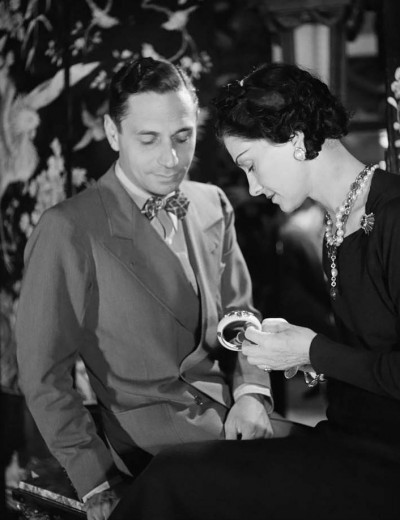
Fulco di Verdura
About
Fulco Santostefano della Cerda, Duke of Verdura was born to an aristocratic Sicilian family in 1898. He enjoyed a vibrant childhood with his older sister at their countryside Palermo home, Vissa Niscemi. Every detail of these extraordinary surroundings, from the rich Chinese silk wall linings to the lush gardens and a menagerie of exotic pets, inspired Verdura’s designs throughout his career.
In the 1920s, Palermo became a popular destination for the American and European beau monde. Among this illustrious crowd were Linda and Cole porter, who became lifelong friends of Fulco. One evening at a party hosted by the Porters in Venice, Linda introduced the young bon vivant to Coco Chanel. Already at height of her fame. It was an introduction that would forever change his life.
Chanel hired him as a textile designer, and it did not take long for her to become impressed with his eccentric taste and modern sensibilities. At this time, Chanel received an abundance of jewelry from her admirers, each piece very different from her own aesthetic sensibility. Chanel and Fulco shared not only a fascination with jewelry, but also a rebellious creative vision. Recognizing his genius for the whimsical and innovative, Chanel elevated Fulco to head designer, in charge of creating her private and boutique jewelry collections.
Fulco worked for Chanel for eight years. They traveled throughout Europe together visiting exhibits and museums; the “Byzantime” look became the inspiration for Chanel jewelry. It was during this period that Verdura’s signature motif, the Maltese Cross, came to be.
Fulco moved across the Atlantic with his friend Nicky de Gunzberg in 1934. They toured America in a new Packard convertible, starting in New York, the Palm Beach and, finally, Hollywood. Fulco eventually settled in New York with hopes of applying his design experience. Introduced by Diana Vreeland, one of Chanel’s best clients, he landed a stint with Paul Flato. “Verdura for Flato” was soon recognized and admired by the fashion world. Inspired by classical patterns and natural forms, Verdura mixed precious and semi-precious stones in bowknots, on seashells and on winged-hearts.
With a demand for more glamorous jewels in Hollywood, Fulco traveled to the West Coast and stayed with Cole Porter on extended trips. His Sicilian-themed designs caught the eye of many Hollywood elite, including celebrities like Gary Cooper, Henry Fonda and jack Benny, and leading ladies such as Joan Crawford, Katharina Hepburn, Jean Howard, Loretta Young and Greta Garbo. In fact, the Curb-link bracelet watch was a lifelong favorite of Garbo’s, and she was often photographed wearing it.
With the backing of Cole and Linda Porter, Fulco opened his own shop on September 1, 1939. The 1940s continued to bring great renown to Fulco and a deepening friendship with the Porters.
Fulco became close friends with some of his most fashionable and respected clients, including the Duke and Duchess of Windsor, Mona Bismarck, Doris Duke, Slim Keith and the three Cushing sisters, who marrid into very prominent New York families. It was one of these sisters, Babe Paley, a style icon of the era, who became his muse and set the tone for his career as a high-society designer in the ‘50s and ‘60s until his retirement in 1973 at the age of 75.
In 1985, Ward Landrigan, formerly the head of Sotheby’s USA jewelry division and a longtime admirer of Fulco die Verdura’s jewelry, purchased the company, including nearly 10.000 of Fulco’s original sketches. The New York salon opened at its current location overlooking Central Park, and today the glamour and vibrancy of Verdura remains as inspirational as the man himself.